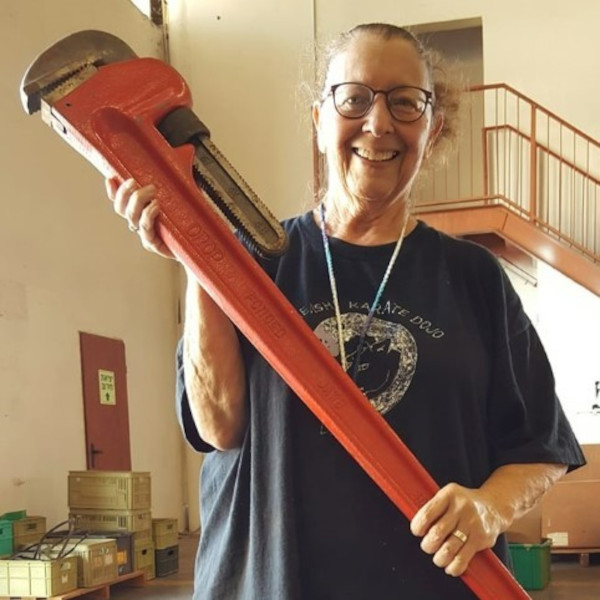Interviews with Olim
Each month, we interview an oleh or olah for our newsletter.
We invite you to read the stories of LGBTQ+ people who have made Israel their home.
"I grew up with the idea that one’s goal was to come home, to come to Israel."
Interview date: May 2019
Q. Where were you born and where did you grow up?
A. I was born and raised in Manhattan, Upper West Side. My wife and I moved to Western Massachusetts in 1984, and really loved New England small town life.
It’s interesting that attitudes to us at our synagogue changed when we were legally married in 2004. Suddenly people had familiar social conventions to fall back on. The change was fascinating to watch!
Q. At what age did you come out? And how did it go?
A. I first fell in love with Hazel, who had grey eyes and naturally curly hair. I was four and a half! When I think of her now, my heart still goes pit-a-pat—at 75!
My first actual relationship was at age 15 and lasted almost 10 years. We were of necessity completely closeted, knew only three other Lesbians in New York. This was 1959, a very different world from now.
Q. Were you involved at all in the LGBT community back home?
A. There was no LGBT in those early days. We had to fight for L! My partner and I became members of Daughters of Bilitis in 1959, one friend was a member of Mattachine, but that was mostly men. DOB was very secretive/closeted/protected/protective, no one ever used last names! Later, in the late 1960s and 1970s, I was involved with Lesbian separatist organizations in New York, and I trained in a women’s martial arts school, most of whose members were Lesbian. We were very politically active around anti-rape issues, women’s rights, and lesbian rights.
During the 1970’s, I became more broadly political—I demonstrated against the war in Vietnam, was involved in labor union organization, and worked at the New York Civil Liberties Union, involved in lobbying the New York State Legislature regarding pending legislation.
Q. What is your involvement (if any) in the LGBT community in Israel?
A. Virtually none.
Q. How long since you made Aliyah?
A. My wife and I made aliyah in August 2014.
Q. Did you move here on your own or with family/friends/significant other?
A. With my wife. Shosh was diagnosed with cancer 17 April 2018 and died 23 August 2018, just 4 weeks and 6 days later. I’m trying to figure out how to live alone after 36 years together.
Q. Why did you make Aliyah?
A. The hardest question in the world! My mother was a socialist Zionist. I grew up with the idea that one’s goal was to come home, to come to Israel. Shosh started reading about Israel in high school—she knew more history than I ever will! It took us a while, but we got here.
Q. How is it going so far?
A. It’s been hard in some practical ways (most notably Hebrew), but we quickly made very good friends here. It feels like home.
Q. What do you do in terms of work?
A. I am retired. I was a neuropsychologist. I did assessments for dementia and counseling with families. Now, I volunteer for the IDF every Thursday. I teach a chair exercise class for seniors twice a week at the Karmiel English Speakers Club. I’m on the board of KESC and on the Committee for the local chapter of ESRA. I take classes at Kehillat haKerem, the Masorti synagogue in Karmiel and two Hebrew classes. I am as busy as ever, but now I choose what I do! Retirement is great!
Q. How is your Ivrit?
A. I’m good with food!
Q. What has been your biggest challenge so far?
A. Learning Hebrew and learning how to live without Shosh.
Q. How do you perceive the Israeli LGBT community?
A. I have had very limited contact. My primary problem is that events are difficult to get to. They take place far from the train and long walks from connecting buses that run only once an hour!??
Q. How is being LGBT in Israel different from back home?
A. Generally easier. When I was asked, as frequently happened, if Shosh was my sister, not a single person has batted an eye when I said she was my wife! The State of Israel even has a form for Bituach Leumi to determine which one pays in same-gender marriages. It’s amazing really. And not at all what I expected!??
Q. If you were making aliyah now, would you do anything differently?
A. Nothing I can think of.
Elisheva

Our Newsletter
Sign up if you would like to receive a monthly email listing events of interest to LGBT English-speakers in Israel, an interview with an oleh/olah and other useful information.
Want to be interviewed?
Complete the form below and we will get back to you.
Our Newsletter
Sign up if you would like to receive a monthly email listing events of interest to LGBT English-speakers in Israel, an interview with an oleh/olah and other useful information.
Want to be interviewed?
Complete the form below and we will get back to you.


